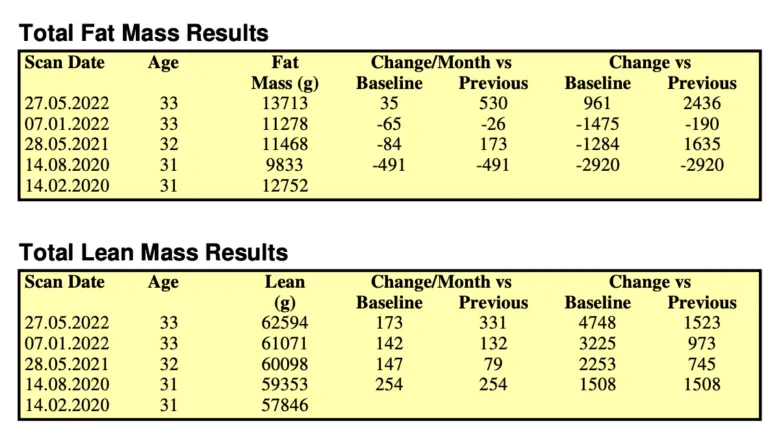
Muscle-building is a slow, unpredictable process subject to a range of variables (unlike fat-loss, which essentially comes down to a calories-in/calories-out equation of energy balance).
It’s therefore impossible to predict exactly how long it will take to build muscle for a specific individual.
For most people, though, muscle-building takes time. The experienced, natural bodybuilder in the clip below made a second visit to Bodyscan for a DEXA scan and was shocked to discover than in three years he had only gained 600g of lean mass. That’s just 200g a year! (Warning – bad language.)
Don’t be dispirited, though. Your own results could be very different.
‘Soft’ factors that affect muscle-building and are largely outside your control include your age, sex, how long you’ve been weight-training, your genetic muscle capacity, stress, sleep and hormones. Also, if you are tall, your muscle gains will take longer to appear noticeable than the same mass gain on a shorter person (because the increased mass is spread over longer limbs).
Then there are ‘hard’ muscle-building factors that you have direct control over in the gym during your workout (in addition to your diet). The quality of your workout is critical to gaining muscle mass. The better your training programme, the faster you will build muscle.
GET OUR MUSCLE BUILDING GUIDEBut what defines a ‘better’ programme that will reduce the time it takes to gain muscle mass?
In short, the biggest reason people do not gain muscle is that they simply do not work hard enough. They don’t go to the gym frequently enough, they don’t do enough sets, enough reps, they don’t lift a heavy enough weight and they don’t go to (or close enough to) failure.
All those factors can be summarised as volume and intensity. Higher volume and intensity will typically see greater increases in muscle mass. In terms of volume, four sets of 12 reps is a 60% increase over three sets of ten reps, and for very little extra time spent in the gym
If you are completely new to weights, with a good diet and sufficient protein, an optimised programme could see you make noticeable gains in 12 weeks or so. As a newbie, your muscles will be new to, and react quickly to, the stimulus of heavy resistance.
As you gain weight, an accurate and consistent means of measuring your body composition, such as a DEXA scan, will reveal how much of your weight gain is lean mass and how much is body fat. It is common for increased body weight and a ‘full’ muscle appearance to be due mainly to fat, which is not what you want.

If a DEXA scan reveals an unfavourable proportion of body fat, it means you are either eating too many calories or do not have an optimised programme. Or both. Regular DEXA scans will enable you to make incremental improvements to your regimen, instead of ploughing on for too long in a sub-optimal direction. The report extract above shows consistent lean gains at every scan (1508g, 745g, 973g, 1523g).
BOOK YOUR DEXA SCAN NOWBuilding muscle mass takes TUT!
You may have heard of ‘time under tension’ or TUT. This is how long your muscles are actually working and under stress during each set. Obviously more reps will mean a longer TUT, which is good. But even with lower reps (to which some people may respond better than higher reps), a longer TUT is good, so exercise pace and technique are very important.
It’s common to see very bad form in the gym – people (men in particular) selecting weights that are way too heavy, which forces them to adopt terrible form (swinging or yanking the weight to provide momentum, using all the wrong muscles, letting gravity do half the movement) and perform too few reps to encourage hypertrophy (an increase in muscle mass).

These ‘hard’ in-gym factors will have a huge bearing on how long it takes you to build muscle. Make sure you have great form, work with sufficient volume and intensity, and hit each muscle group at least twice a week.
Total calories and protein are also critical factors (over which you have control) when it comes to the speed at which you’ll build muscle.
If you are not carrying excess fat then you should aim to eat in a small calorie surplus; start with just 200-300 calories above maintenance. Combined with a great programme, this is the sweet spot for muscle growth. An alternative approach is to aim for a gain of 1-2% of total body weight each month.
(Incidentally, if you are carrying excess fat then fat loss, not muscle growth, is your priority – eat in an appropriate calorie deficit but still engage in a great resistance programme to minimise muscle loss.) Get our fat-loss guide here and watch this video to understand the essential differences between fat loss and muscle gain.
A good way to calculate your maintenance calories is with a DEXA scan (see video below), because it enables the use of a more accurate formula (using lean body mass) than the traditional ones based on age, height, weight and sex. This video explains why the standard formulae used by those with low muscle mass (which you may have if you’re a newbie) will get your maintenance calories wrong.
Finally, a big factor that will affect how long it takes you to build muscle is protein intake. Protein is the building-block of muscle tissue and the evidence suggests doses of 1.6-2.2g per kilo of body weight appear sufficient for muscle growth. Though higher doses, up to 3.3g/kg may be beneficial in reducing the proportion of fat in any weight gain, and helping preserve muscle when on a fat-loss or ‘cut’ phase.
So, in summary, when it comes to how long it will take you to build muscle mass there are a large number of factors at play. Some of these are beyond your control – age, sex, genetics – and some are very much within it – volume, intensity, technique, diet.
So, to maximise your gains and minimise the time it takes to build muscle, focus on getting the mechanics and logistics right and don’t stress about things you can’t control!